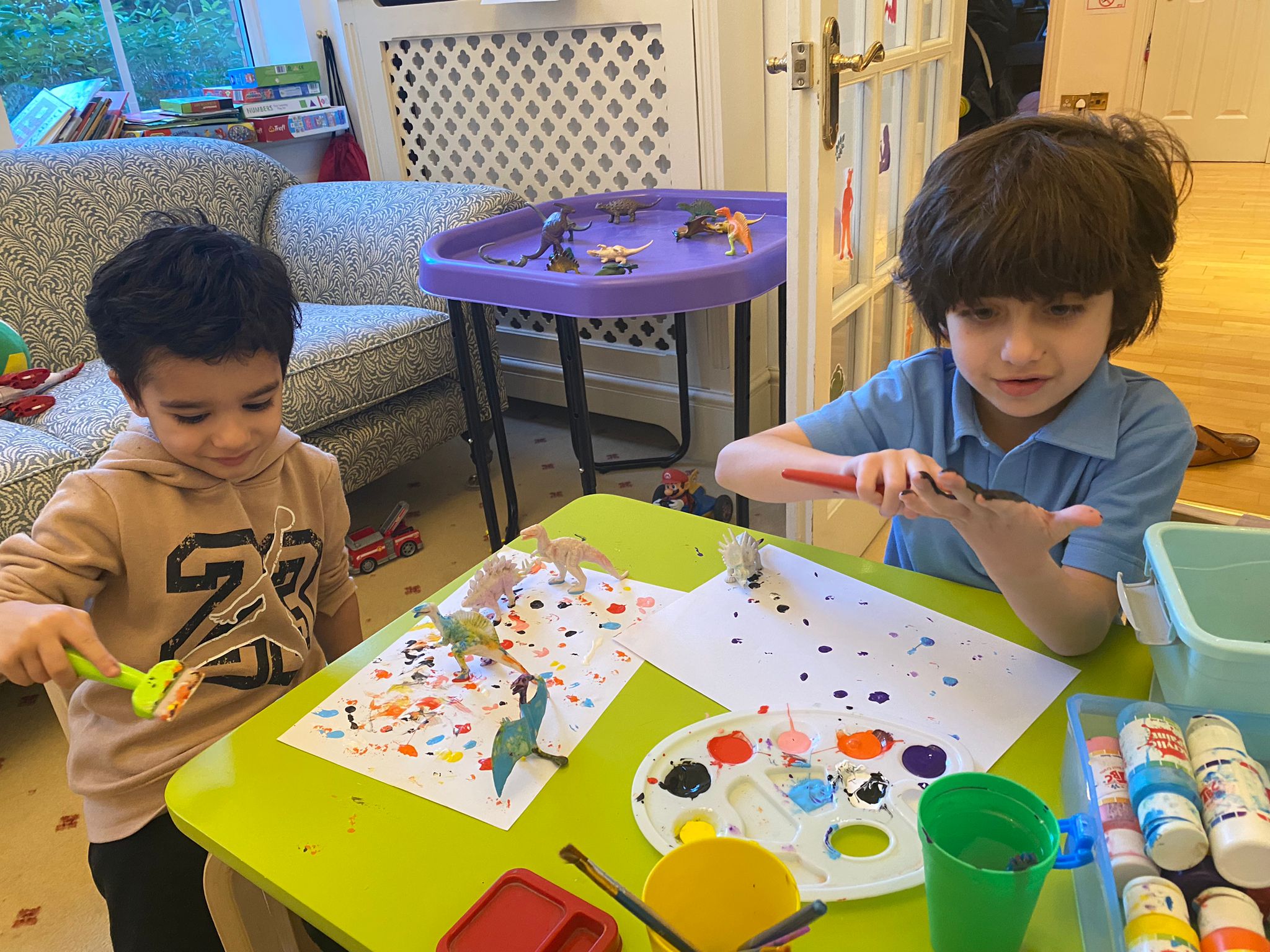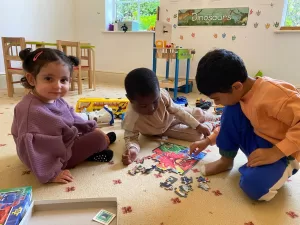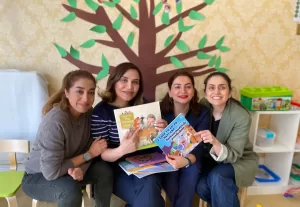The Early Years Foundation Stage (EYFS) framework is a fundamental part of early childhood education, designed to support the development of young children in a structured and meaningful way. This framework outlines the 7 areas of learning EYFS, ensuring that children receive a well-rounded education that nurtures their cognitive, social, emotional, and physical growth.
Mrs Malahat, the experienced manager of Happy Chalet, with over 15 years in early childhood education, emphasises:
Understanding the EYFS 7 areas of learning is crucial for parents to grasp how these early years shape their child’s future development.
By focusing on these areas of learning EYFS, children gain essential life skills, preparing them for future education and helping them develop a strong sense of self.
Why Are the 7 Areas of Learning EYFS Important?
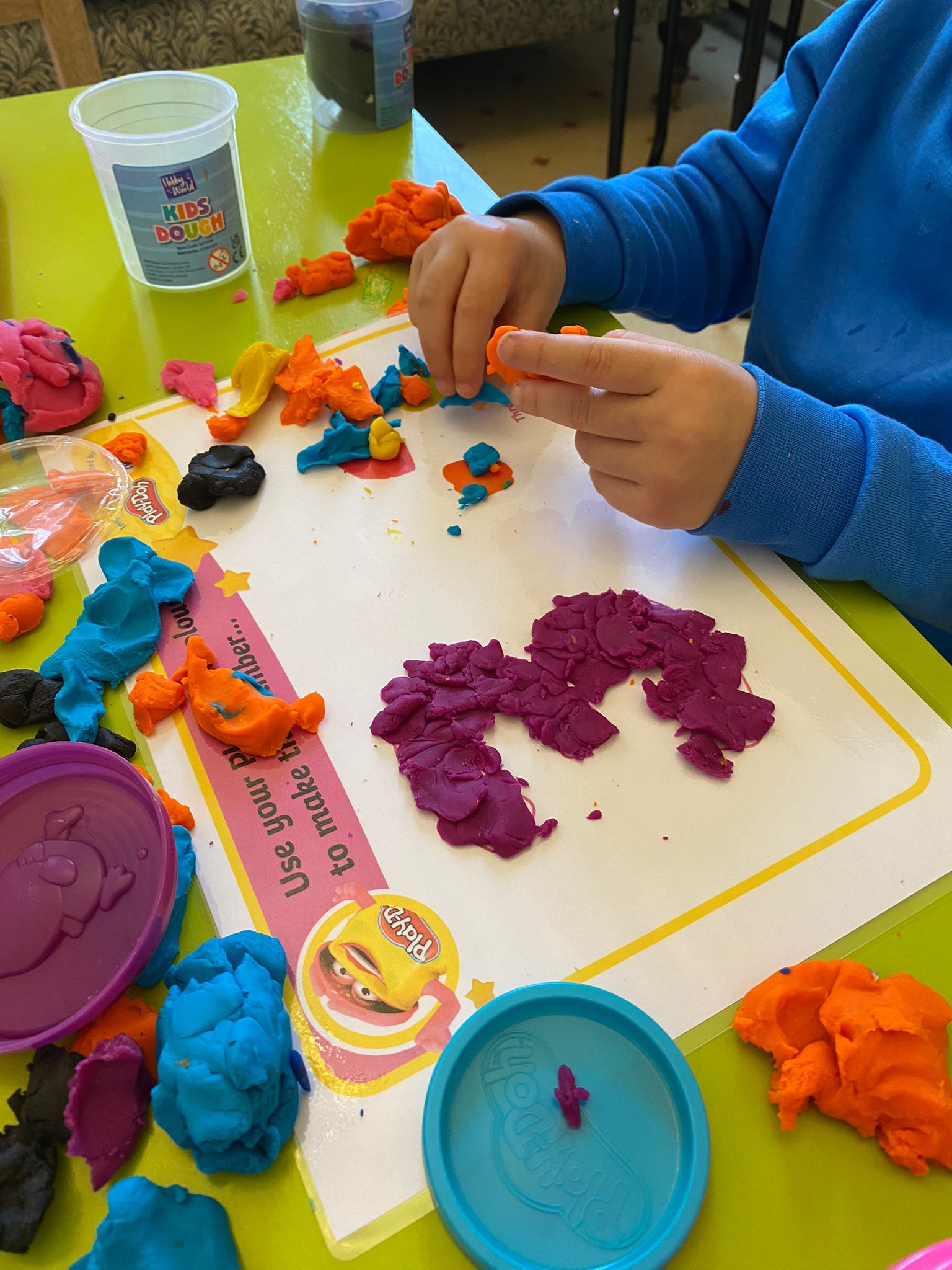
The seven areas of learning in the EYFS are not just academic milestones—they encompass all aspects of a child’s growth, including:
- Physical well-being – Encouraging healthy habits and coordination.
- Emotional and social development – Building relationships and managing emotions.
- Cognitive skills – Enhancing problem-solving and creativity.
A well-balanced approach to these EYFS areas of learning ensures children are equipped with the necessary skills for lifelong success. These early learning experiences foster curiosity, resilience, and adaptability—traits essential for navigating the modern world.
Exploring the 7 Areas of Learning and Development in EYFS
1. Communication and Language Development
This area is essential for helping children express themselves and interact confidently in different settings. At Happy Chalet, activities such as interactive storytelling, role-playing, and group discussions enhance children’s:
- Listening and attention skills
- Speaking abilities
- Understanding of language
Strong communication skills are fundamental, as they impact learning across all EYFS areas of learning and support children’s ability to express thoughts and emotions effectively.
Also Read: Speech and Language Development Milestones in Early Years
2. Physical Development
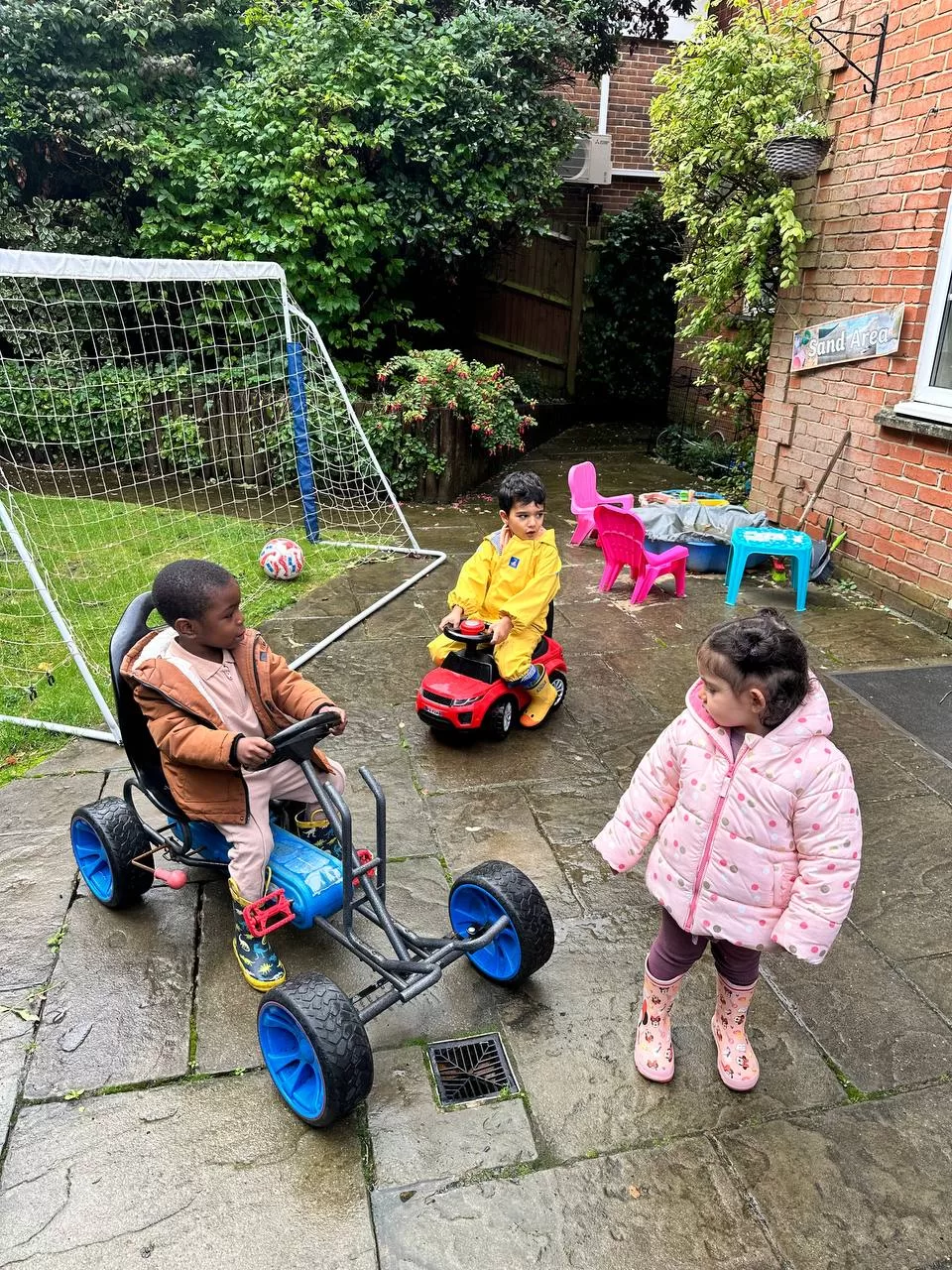
Physical development in early childhood includes both gross motor skills (large movements like running and jumping) and fine motor skills (smaller movements like holding a pencil). Schools focus on:
- Outdoor activities – Running, climbing, and obstacle courses.
- Fine motor exercises – Writing, cutting, and crafting.
- Health and self-care lessons – Learning about hygiene and nutrition.
Encouraging physical activity at an early age fosters healthy habits that benefit children throughout their lives.
3. Personal, Social, and Emotional Development
This specific area of learning focuses on emotional intelligence and social interaction. Through activities such as cooperative games, role-playing, and circle time discussions, children develop:
- Self-awareness and confidence
- Empathy and emotional regulation
- Positive relationships with others
A strong foundation in social-emotional development helps children navigate friendships, conflicts, and self-expression effectively.
Also Read: Transitioning to Nursery: Managing Separation Anxiety
4. Literacy Development
Literacy is fundamental in early childhood education, as it introduces children to reading and writing through engaging activities. At Happy Chalet, children participate in:
- Phonics programs – Helping with letter recognition and sounds.
- Storytelling sessions – Encouraging a love for books.
- Early writing exercises – Supporting handwriting development.
A love for reading and writing enhances learning across all 7 areas of learning EYFS and builds strong foundational skills for future education.
5. Mathematics
Mathematical development in the EYFS areas of learning focuses on making numbers fun and relatable. Practical activities include:
- Counting real objects – Strengthening number recognition.
- Exploring shapes and patterns – Developing spatial awareness.
- Problem-solving activities – Encouraging logical thinking.
By introducing maths in an engaging way, children gain confidence in using numbers in everyday life.
6. Understanding the World
This area encourages children to explore their environment and different cultures. Through hands-on experiences like:
- Nature walks – Observing the natural world.
- Cultural celebrations – Learning about diversity.
- Simple science experiments – Encouraging curiosity.
Children develop a broader understanding of the world and how they fit into it, fostering appreciation for different communities and traditions.
7. Expressive Arts and Design
Creativity plays a key role in early childhood learning. This area allows children to express themselves through:
- Music and movement activities – Enhancing coordination and self-expression.
- Painting and crafting – Developing fine motor skills and creativity.
- Drama and role-play – Encouraging imaginative thinking.
Focusing on creativity helps children develop problem-solving skills and emotional expression.
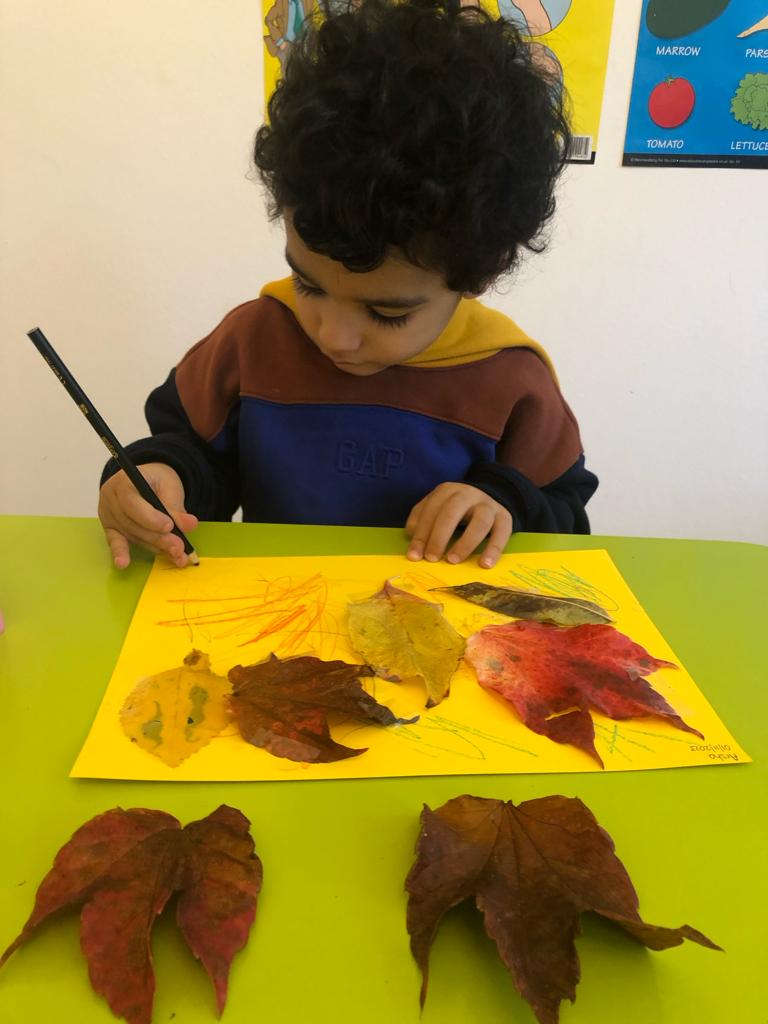
The Four Guiding Principles of the EYFS Framework
The 7 areas of learning and development in EYFS framework is anchored by four principles essential to its effectiveness. These principles ensure that the approach to early childhood education and care is holistic, flexible, and tailored to meet the diverse needs of every child.
- Each Child’s Uniqueness: The EYFS framework recognises the unique nature of every child, identifying their distinct abilities, interests, experiences, and learning paces. It encourages personalised support that moves away from generic educational strategies, focusing instead on individual needs. This approach promotes environments that nurture a child’s talents and interests, aiding in developing a strong sense of identity and self-worth.
- Importance of Positive Relationships: The framework places significant emphasis on the role of positive relationships in the development of a child. It advocates for nurturing relationships with parents, teachers, and peers, characterised by warmth, understanding, and respect. Such relationships provide a stable foundation for growth and learning. Caregivers and educators are vital in modelling these positive interactions and creating a supportive and nurturing atmosphere conducive to a child’s development.
- Enabling Environments: A key focus of the EYFS is on creating safe, engaging, and responsive environments for children. These settings are envisioned to be rich in resources, promoting exploration, discovery, and learning across all areas of the EYFS framework. Furthermore, the framework considers the broader context of a child’s life, including their home and community settings, recognising these as integral to their overall development and learning.
- Children Develop in Different Ways and at Different Rates: The EYFS framework acknowledges that each child develops according to their timeline and methods. It advocates for a flexible approach to education and care that is tailored to the unique development trajectory of each child. The framework underscores the importance of patience in the educational process, advising against pushing children to achieve certain developmental milestones before they are ready and allowing them to progress at their own pace.
These principles ensure that learning remains flexible and supportive, catering to the diverse needs of young learners.
Learn more about Home-Based Nursery: Benefits and Differences
Final Thoughts on the 7 Areas of Learning EYFS
The 7 areas of learning EYFS provide a well-rounded foundation for children’s growth, helping them develop essential life skills. Mrs Malahat summarises:
At Happy Chalet, we ensure each child thrives by nurturing all areas of development, giving them the best start in life.
By understanding these EYFS areas of learning, parents and educators can better support children in their journey towards a bright and successful future.
FAQs About the 7 Areas of Learning EYFS
1. What are the 7 areas of learning EYFS?
The seven areas include Communication and Language, Physical Development, Personal, Social, and Emotional Development, Literacy, Mathematics, Understanding the World, and Expressive Arts and Design.
2. Why are the EYFS 7 areas of learning important?
They ensure a well-rounded education that supports children’s academic, social, and emotional growth, preparing them for future learning.
3. How do nurseries implement the areas of learning EYFS?
Nurseries use structured activities such as storytelling, outdoor play, art, and maths games to support development in each area.
4. What are the three prime areas of learning?
The three prime areas are Communication and Language, Physical Development, and Personal, Social, and Emotional Development. These are the foundation for all learning.
5. What are the four specific areas of learning?
The four specific areas of learning are Literacy, Mathematics, Understanding the World, and Expressive Arts and Design. These build on the prime areas.
6. How can parents support the 7 areas of learning and development at home?
Parents can encourage learning through reading together, engaging in creative activities, playing educational games, and fostering a love for exploration.

